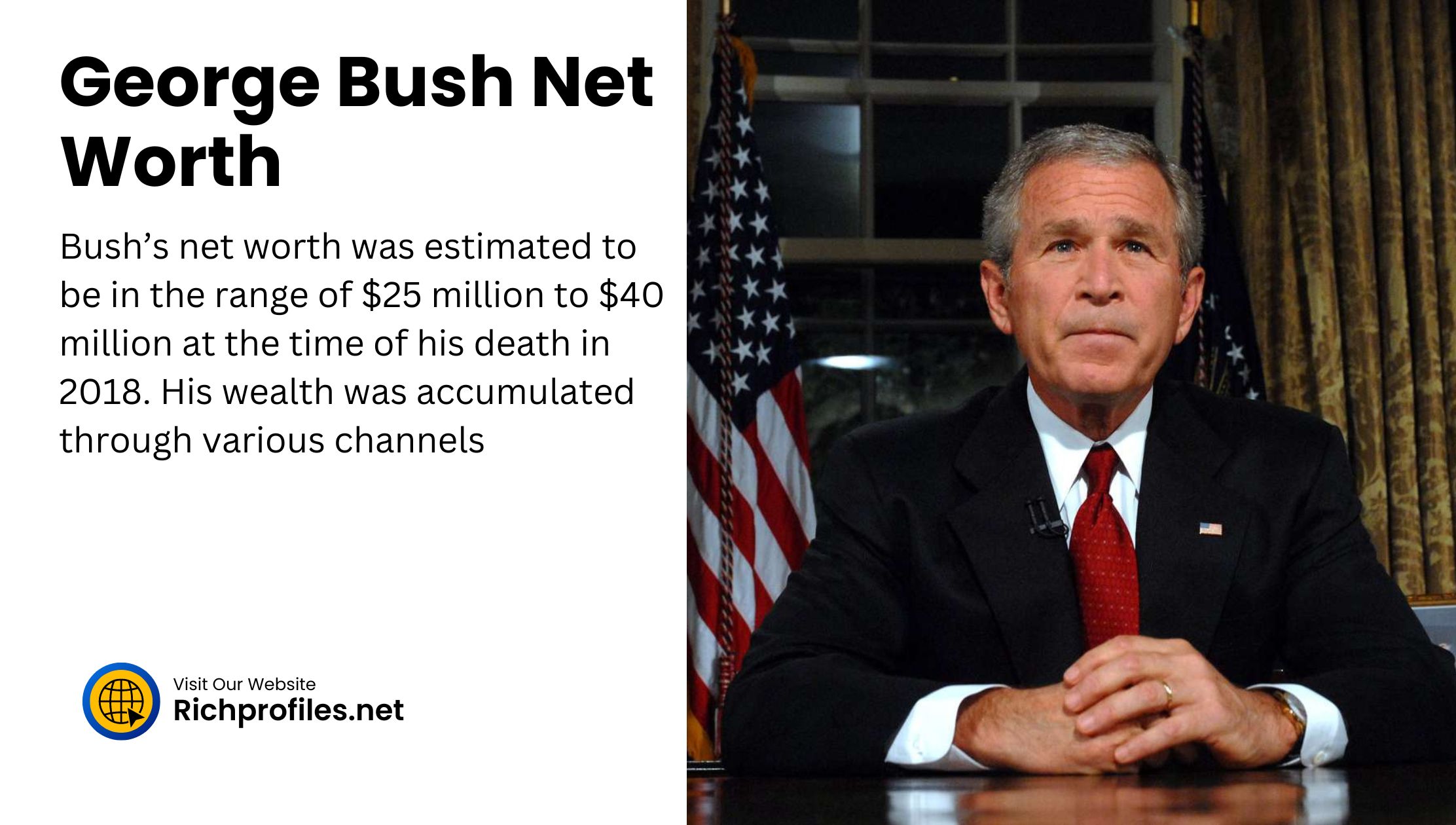George Bush Net Worth: A Look at His Net Worth, Life, and Career
George H.W. Bush, the 41st President of the United States, left an indelible mark on American politics. His life is a tapestry woven with military service, political achievements, and philanthropic endeavors. As with many public figures, there’s a significant interest in his financial legacy. This blog post delves into the details of George Bush Net Worth, life, and career, offering insights that appeal to history buffs, political enthusiasts, and financial analysts alike.
Early Life and Military Service
Early Years
George Herbert Walker Bush was born on June 12, 1924, in Milton, Massachusetts, into a family with a strong tradition of public service and business acumen. His father, Prescott Bush, was a prominent banker and served as a U.S. Senator from Connecticut. The young Bush was raised in Greenwich, Connecticut, and attended the prestigious Phillips Academy in Andover, Massachusetts.
Military Service
Bush’s sense of duty was evident early on. After the attack on Pearl Harbor in 1941, he postponed his university plans and enlisted in the U.S. Navy on his 18th birthday. Bush became one of the youngest aviators in Navy history, flying torpedo bombers during World War II. He flew 58 combat missions and was shot down over the Pacific, for which he received the Distinguished Flying Cross for bravery.
Education and Early Career
Yale University
After his military service, Bush attended Yale University, where he excelled both academically and athletically. He graduated in 1948 with a degree in economics. While at Yale, he was a member of the Phi Beta Kappa honor society and the Delta Kappa Epsilon fraternity.
Business Ventures
Upon graduating, Bush moved to Texas to enter the oil business. He co-founded the Zapata Petroleum Corporation in 1953 and later became the president of Zapata Offshore Company, which specialized in offshore drilling. His ventures in the oil industry were successful, significantly boosting his net worth and establishing him as a prominent figure in the business world.
Political Career
Entry into Politics
Bush’s political career began in earnest in the 1960s. He was elected to the U.S. House of Representatives from Texas’s 7th district in 1966, serving two terms. Although he lost a bid for the U.S. Senate in 1970, his political journey was far from over.
Various Roles
Bush held several key positions in the U.S. government, including:
- U.S. Ambassador to the United Nations (1971–1973)
- Chairman of the Republican National Committee (1973–1974)
- Chief of the U.S. Liaison Office in China (1974–1975)
- Director of the Central Intelligence Agency (1976–1977)
Vice Presidency
In 1980, Ronald Reagan selected Bush as his running mate, and together they won the presidential election. Bush served as Vice President from 1981 to 1989, a period marked by significant events such as the end of the Cold War and the Reagan administration’s economic policies.
Presidency (1989–1993)
Domestic Policies
Bush’s presidency saw significant domestic initiatives, including the Americans with Disabilities Act of 1990, which prohibited discrimination based on disability, and the Clean Air Act Amendments of 1990, which addressed acid rain, urban air pollution, and toxic air emissions.
Foreign Policies
Bush’s foreign policy achievements were notable:
- End of the Cold War: Bush skillfully navigated the complexities of the Cold War’s conclusion, fostering a cooperative relationship with the Soviet Union’s last leader, Mikhail Gorbachev.
- Gulf War: In response to Iraq’s invasion of Kuwait in 1990, Bush led a coalition of nations to liberate Kuwait, showcasing his commitment to international law and order.
Post-Presidency and Legacy
Philanthropy
After leaving office, Bush remained active in public service, engaging in various philanthropic efforts. He collaborated with his former political rival Bill Clinton on humanitarian missions, including disaster relief efforts for the 2004 Indian Ocean tsunami and Hurricane Katrina in 2005.
Read More: Scott Stuber Net Worth
Legacy
Bush’s legacy is multifaceted, encompassing his contributions to ending the Cold War, his leadership during the Gulf War, and his advocacy for disability rights. His dedication to public service, both in and out of office, left an enduring impact on American society.
Net Worth
Financial Overview
Bush’s net worth was estimated to be in the range of $25 million to $40 million at the time of his death in 2018. His wealth was accumulated through various channels:
- Oil Industry: His early ventures in the oil industry laid the foundation for his financial success.
- Political Career: Although public service roles do not typically offer substantial financial rewards, Bush’s political influence and connections likely provided lucrative opportunities after his presidency.
- Investments: Like many affluent individuals, Bush likely benefited from wise investments and financial management.
Comparison with Other Presidents
Compared to other modern U.S. presidents, Bush’s net worth was moderate. For instance, Ronald Reagan’s net worth was estimated at around $13 million, while Bill Clinton’s net worth is currently estimated to be over $80 million, largely due to book deals and speaking engagements.
Conclusion
George H.W. Bush’s life was a testament to dedication, service, and leadership. From his heroic service in World War II to his impactful presidency and beyond, Bush’s legacy is rich and varied. His net worth, while significant, is just one facet of a life marked by public service and a commitment to making the world a better place.

